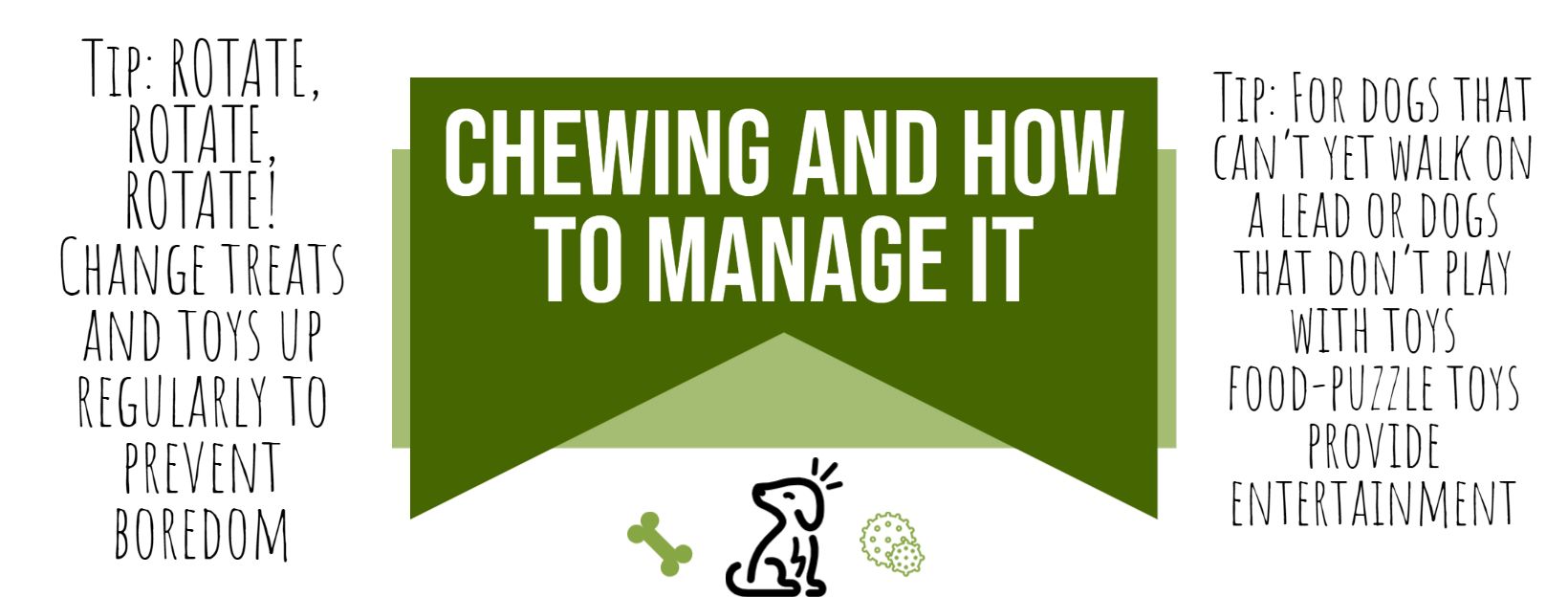
Chewing is a natural behaviour for dogs, however there is a difference between appropriate chewing (on bones, chew toys etc.) and destructive chewing. There are many reasons for destructive chewing, and these include:
Boredom – bouncy dogs have naturally high activity levels and can easily become bored; this can lead to destructive behaviour. Increasing their physical and mental stimulation should remedy this behaviour. This can occur in the owner’s presence or absence.
Puppy Teething – occurs between 3-7 months when puppies chew to relieve the discomfort in their gums.
Attention Seeking – if your dog learns that chewing something gains your attention, they will very quickly learn that this is a great way to get attention. If this is often the reason chewing will occur in the owner’s presence.
An Unbalanced Diet – dogs may chew to replace something which is lacking in their diet, a high-quality complete food should remedy this behaviour.
Distress at Being Left Alone – Some dogs cannot cope with being left and are destructive, this is usually categorised by the nature of the chewing – doors and windows are common areas that become chewed in an attempt to get out to be reunited with their owner. It is advised that you practice teaching your dog to be alone from you even for a short period of time.
What can be done about destructive chewing?
Limit your dog’s access around the house to minimise that damage that can be done, a crate is useful in this situation. You need to build up their tolerance to being crated, a dog cannot just be locked into a crate for any period of time. If you think your dog is chewing or being destructive due to anxiety then you need to quickly seek the help of a Canine Behaviourist before the problem gets worse (Oakwood Canine Services: training@oakwoodcanineservices.co.uk, tel: 01482 823555)
Supply your dog with plentiful amounts of safe chewing toys. Activity balls and Kongs are excellent for this. Make sure there is also a variety – chews, pigs ears, toys of different textures are important. You can rotate these on a daily basis, for example
Monday – Kong and Yak Milk Chew
Tuesday – Buffalo Horn and a Pizzle
Wednesday – Filled or empty Hoof and a Kong
Thursday – Kong with different filling
Friday – Pigs Ear and Activity/Puzzle Ball
Saturday – Antler and Kong
Sunday – Pigs Ear and Kong
Regularly exercise your dog (if they are walking, alternatively, get them into the garden)– 2-3 times per day for at least an hour, more if it is before they are being left. Make sure you interact with your dog on the walk, so play ball, hide and seek. Do not just go out for a stroll and let your dog please himself.
If the chewing occurs in the owner's presence, remove the offending item from the dog by swapping it with something acceptable to chew, this will teach your dog what it can and cannot chew. This needs to be done quietly with no shouting.
Play with your dog – try and play with your dog at least 3 times per day, for at least five minutes each, short frequent sessions are the best. If your dog is not interested in toys, use food-puzzle toys.
What Makes Chewing Worse?
- Taking everything away from your dog and leaving nothing appropriate to chew
- Lack of Physical and Mental Stimulation
- Keeping your dog in one place e.g. never taking him out of the house or garden (we understand that this will be difficult for some – contact us if you need!)
Mistakes will happen but never tell off, or shout at your dog for chewing the wrong things, consider it your fault and not the fault of your dog for leaving something in a place he can reach it. Punishment only makes your dog think you are unpredictable and has long lasting effects on your relationship with each other, plus an anxious dog is much more likely to chew.